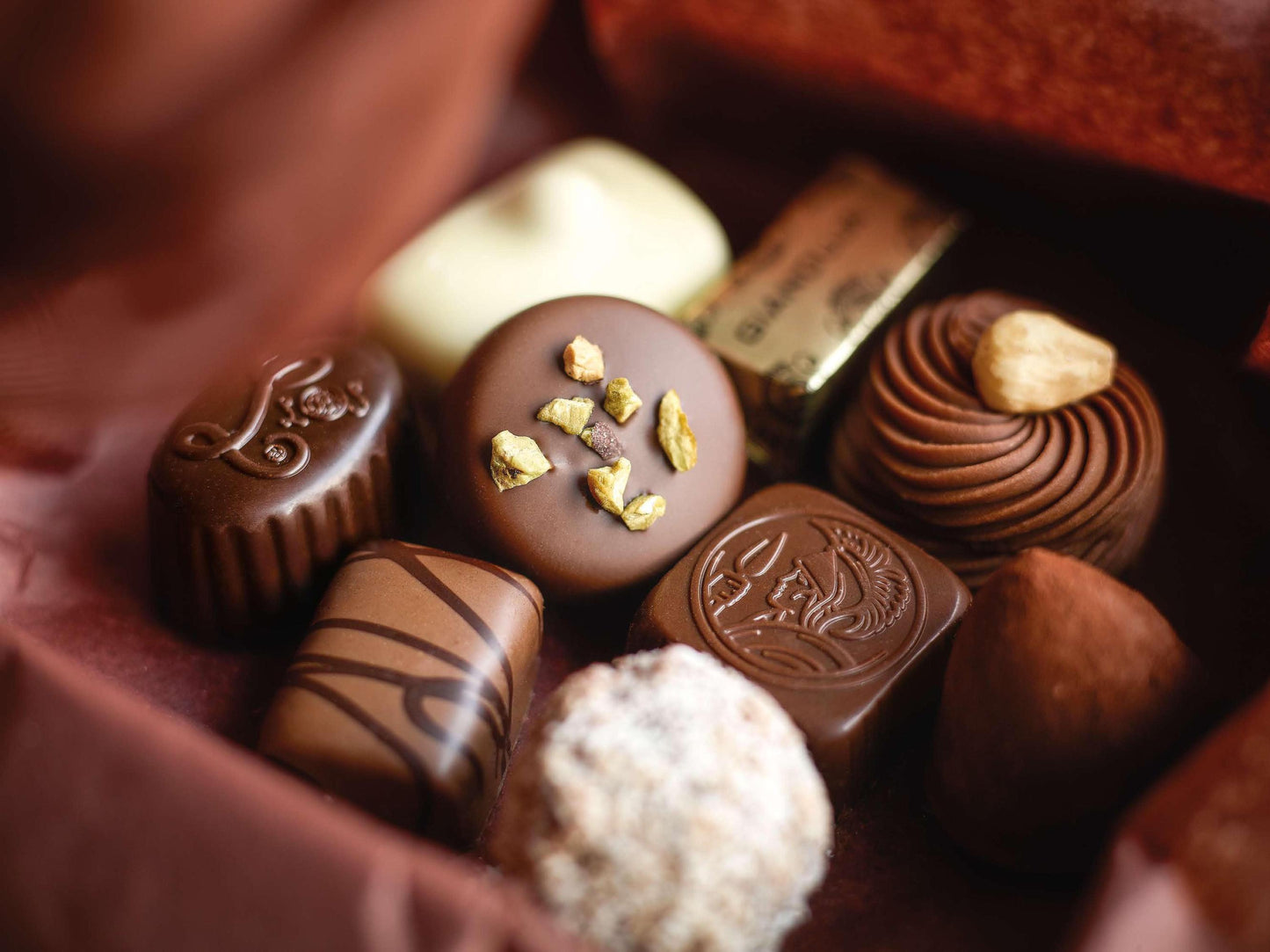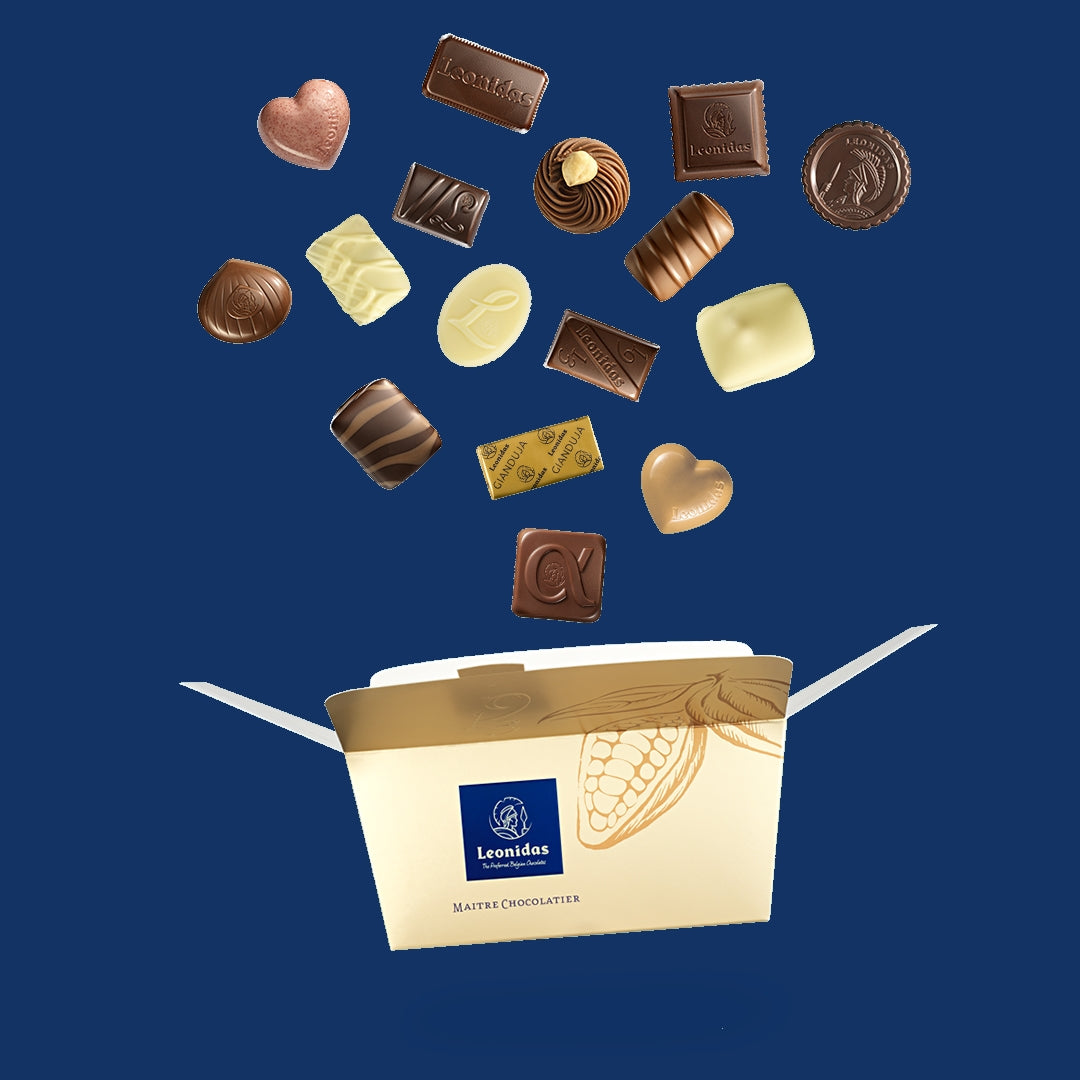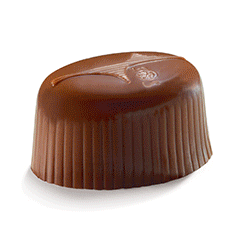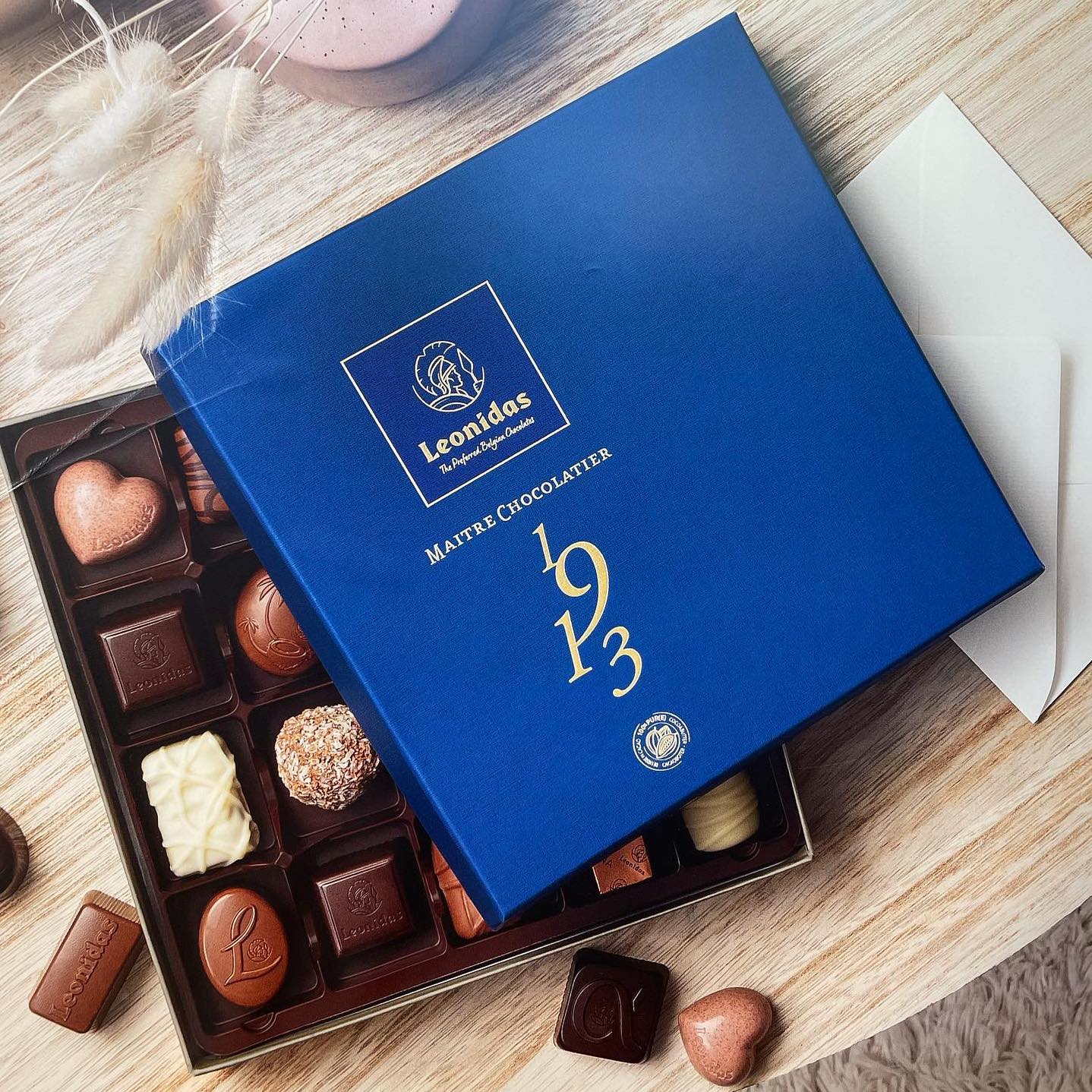Frequently Asked Questions
Find answers to all your queries about our services, products, and more at the comprehensive FAQ section of Leonidas Brighton. Get to know about our delicious chocolates, ordering process, delivery options and much more. Make your chocolate shopping easier and hassle-free!
Leonidas chocolates are renowned for their superior quality and are made in Belgium. These chocolates are composed of several ingredients including cereals, dairy ingredients, eggs, gluten, nuts such as almonds, coconut, hazelnuts, pistachio and walnuts, sesame seeds, soja, and sulphites. Certain chocolates also contain alcohol as a preservative and/or for flavouring.
Yes, some of our chocolates do contain alcohol for preservation and flavour enhancement. However, we provide detailed information about the specific chocolates that contain alcohol on the product pages.
Leonidas chocolates are indeed suitable for vegetarians. However, they are not suitable for vegans as our products contain dairy ingredients.
Since 3 August 2003, a European Directive has allowed chocolate manufacturers to use vegetable fats (instead of cocoa butter) in their chocolates, albeit under certain very strict conditions. This Directive caused a lot of controversy among manufacturers and consumers, but at Leonidas we have a very clear and simple position on this issue. Leonidas is and will continue to be committed to using 100% cocoa butter.
As regards the use of palm oil in particular – a raw material that is the subject of a great deal of debate these days – Leonidas does not use palm oil in its chocolates.
Leonidas wishes to point out, however, that traces of palm oil are present in its orangettes. These trace amounts (< 1%) come from the processing of the candied orange strips carried out by their provider.
Nevertheless, Leonidas has decided to look for alternatives without palm oil, and is working with suppliers to eliminate even this low percentage of palm oil.
To maintain their high quality, Leonidas chocolates should be stored at a room temperature of 15 - 18 degrees Celsius, in a dry area free from strong odours, and away from heat sources such as sunlight. If your chocolates contain alcohol or butter cream, for best enjoyment, we recommend storing them in a cool place and eating them cool, straight from the fridge.
While Leonidas chocolates are delicious, they contain various ingredients which could potentially trigger allergic reactions. These include cereals, dairy ingredients, eggs, gluten, nuts like almonds, coconut, hazelnuts, pistachio, and walnuts, sesame seeds, soja, and sulphites. However, you don't need to worry about celery, fish/shellfish, lupin, molluscs, and mustard as these allergens are not present in our chocolates.
We are happy to provide guidance on which chocolates are safe for you based on your specific food allergies. Please see here for full allergen information.
Our suppliers ensure that the soya lecithin used in our chocolates comes exclusively from non-GMO soya plantations. Additionally, our glucose and glucose-containing products are guaranteed to be produced.
If your delivery address is in the UK, you can order Leonidas chocolates directly through our website. Simply navigate to our menu to choose from delicious options. If you need any assistance, feel free to reach out to us through the chat box on the bottom right or through our contact form.
If you are ordering from outside the UK, however, please head to Leonidas.com.
Absolutely! We offer the ability for customers to handpick their favourite chocolates to create a personalized box. Simply choose the "Build Your Own Box" option and then select your preferred chocolates.
After an order is placed, it typically takes 1-2 business days for the order to be processed and prepared for shipment. Delivery times will vary based on the delivery method chosen and your location in the UK.
Enjoy the luxury of same-day delivery or store pick-up for chocolates ordered within Brighton from our local Leonidas store.
Once your order has been shipped, you will receive a confirmation email with a tracking number. You can use this number to track the progress of your order.
If you wish to change or cancel your order, please contact our customer service team as soon as possible. However, we cannot guarantee that changes or cancellations can be made once the order has begun processing.
Due to the perishable nature of our chocolates, we are unable to accept returns. If, however, you are unsatisfied with your order or if there was a mistake, please contact our customer service team so we can assist you.
If your chocolates arrive damaged or not as ordered, please contact our customer service team immediately with pictures of the chocolates and a description of the issue. We are committed to ensuring customer satisfaction and will work to resolve any issues as quickly as possible.
Yes, we do offer gift cards that can be purchased directly through our website. They make a perfect gift for any occasion. Just click here, choose the amount you wish to load onto the card, and add it to your cart for purchase. You can also add a gift note at check out.
Yes, provided there is still a balance remaining on the card. You can use it until the balance has been fully depleted.
No, our gift cards do not have an expiration date and can be used until the balance is fully depleted.
Please contact our customer service team as soon as possible if you lose your gift card. We may be able to issue a replacement, depending on the circumstances.
While there's no definitive scientific evidence to suggest that chocolate directly increases lifespan, moderate consumption of dark chocolate - which is rich in antioxidants and flavonoids - has been linked with certain health benefits such as improved heart health.
It may just be a coincidence, but some of the world's oldest people, like Jeanne Calment (1875-1997) and Sarah Knauss (1880-1999), were passionately fond of chocolate. Jeanne Calment habitually ate a kilo of chocolate per week until her physician forced her to give up sweets at the age of 119, three years before she died. You can draw your own conclusions, but one thing we are sure of is that life without chocolate certainly feels a lot longer!
Yes, chocolate, particularly dark chocolate, contains magnesium. This mineral is important for many processes in the body, including regulating muscle and nerve function, blood sugar levels, and blood pressure.
Quite the opposite, in fact. Once it has been absorbed by your body, cocoa produces 72% unsaturated fatty acids which reduce your cholesterol level and clean your arteries. It contains only 20% saturated fatty acids - the kind which aren't so good for you. There's very little cholesterol in dark chocolate made from 100% cocoa butter, like that of Leonidas. In milk chocolate, the cholesterol varies from 15 to 18mg per 100g which is pretty insignificant.
Chocolate has long been associated with love and romance and the Aztec Emperor Montezuma, Casanova, Madame De Pompadour and the Marquis de Sade certainly all thought so!
It contains phenylethylamine (PEA), a natural substance that might mimic the feeling of being in love. So chocolate may not make you a great lover, but you can't help loving chocolate.
Chocolate is often said to have mood-boosting properties, and there is some scientific evidence to back this up. It contains a number of substances that could have an effect on mood, including phenylethylamine and tryptophan, which are precursors to serotonin, a neurotransmitter associated with feelings of happiness.
In moderation, certain types of chocolate can be good for your health. Dark chocolate is rich in antioxidants and can help improve heart health. However, it is also high in sugar and fat, so should be eaten in moderation.
In Belgium, pralines refer to a specific type of chocolate candy that is filled with a soft centre, often ganache or nuts. Chocolates is a more general term that could refer to any type of chocolate treat. So, all pralines are chocolates, but not all chocolates are pralines.
Chocolate comes from the cacao tree, theobroma cacao which is native to the tropical regions of the Americas. The Greek term theobroma literally means "food of the gods". ". Cacao beans were used by the Aztecs to prepare a hot, frothy drink which had stimulant and restorative properties. Chocolate itself was reserved for warriors, nobility and priests. The Aztecs valued its supposed ability to confer wisdom and vitality. A fermented chocolate drink was also used in their religious ceremonies. The sacred concoction was associated with Xochiquetzal, the goddess of fertility. Emperor Montezuma allegedly drank 50 goblets a day. The Aztecs paid their taxes in cacao beans, and 100 cacao beans could buy a slave.
The seeds of the cacao tree are fermented, dried, and roasted to produce cocoa beans, which are then processed into chocolate.
Great question! While both 'cocoa' and 'cacao' come from the same plant, they refer to different things. 'Cacao' refers to the raw beans from the cacao tree, and the tree itself is also known as 'cacao'. On the other hand, 'cocoa' typically refers to the powdered form of the roasted and processed cacao beans. The process involves fermenting, drying, roasting, and grinding the cacao beans. So, in the context of chocolate making, both cacao and cocoa play important roles - cacao is the starting point and cocoa is often the end product used.
When a recent survey asked 20,000 Belgians what they thought about different brands, Leonidas was the outright winner in the chocolate category. In fact, 1 in every 3 top quality Belgian chocolates sold comes from Leonidas - and 55% of Belgians say that we are the most highly-rated chocolate maker in the country. Not bad, in the most chocolate-obsessed country in the world.
Some of our products are included on a list of Kosher-certified ‘milk’ products by the CRC (Chicago Rabbinical Council) (https://www.crcweb.org)
In addition, some of our products are included in a list of authorized products published by the consistory of Paris.
The selection criteria applied by the two bodies are different. We invite you to consult their sites for further details.
For more information on allergens, ingredients, and our Kosher Certificate please see our page here.
At the moment we do not have Halal certification. However, a list that identifies the products that do not contain alcohol is available on request at leonidasbrighton@gmail.com
Welcome to Leonidas Brighton Store
Looking for a treat that's truly special? In Brighton, we've got you covered with our delightful chocolate gifts. They're not just chocolates – they're high-quality, fresh, and oh-so-delicious. Trust us, one bite and you'll see what we mean! And the best part? You can make the gift even more unique with our personalized, Build Your Own Box option. So why wait? Dive into the luscious world of our Brighton chocolate gifts today. It's a taste adventure you won't forget!





